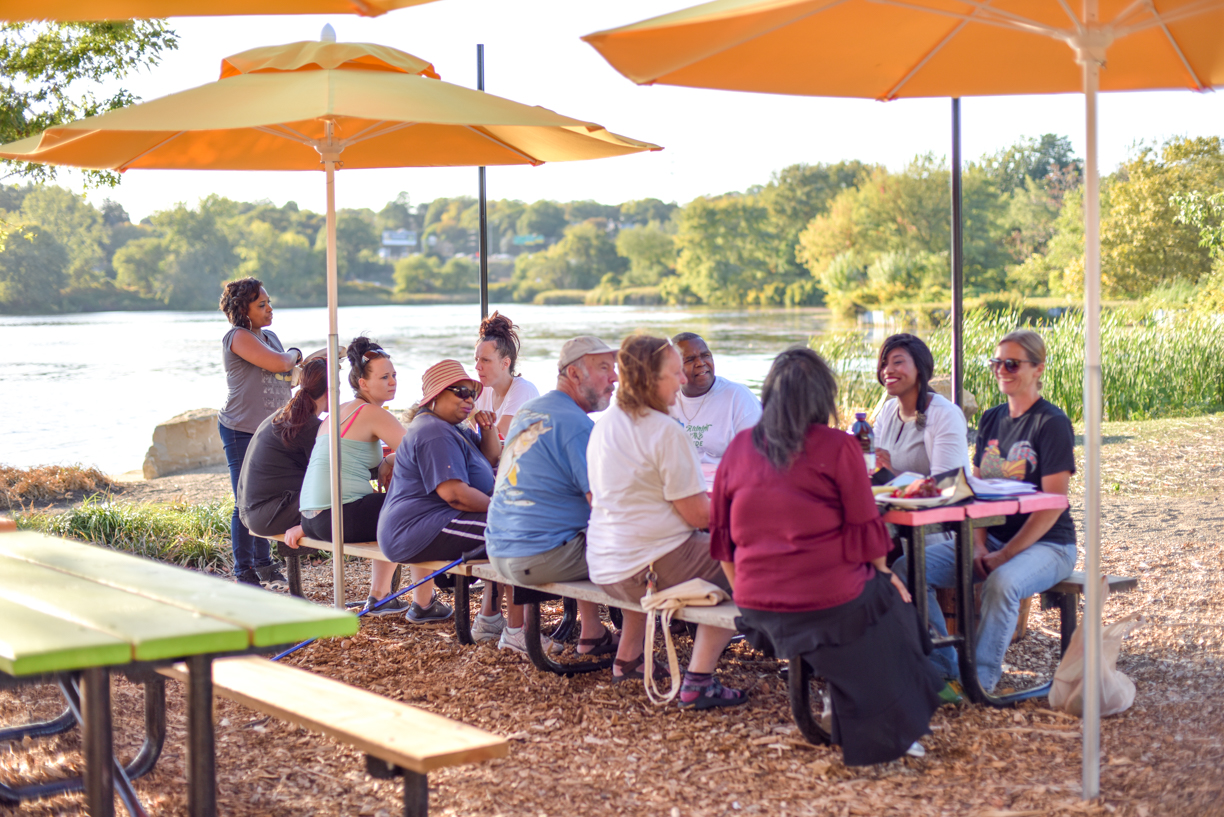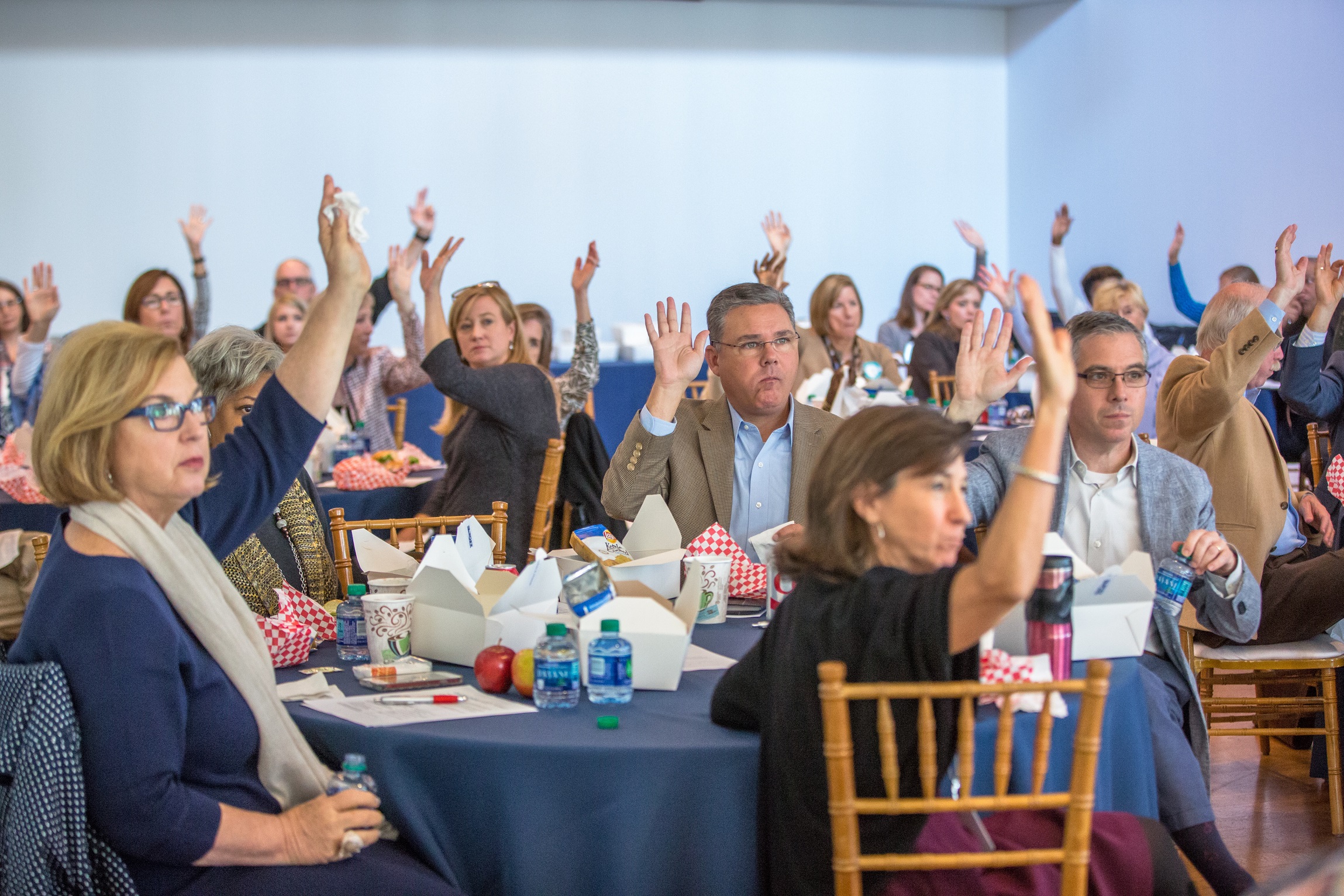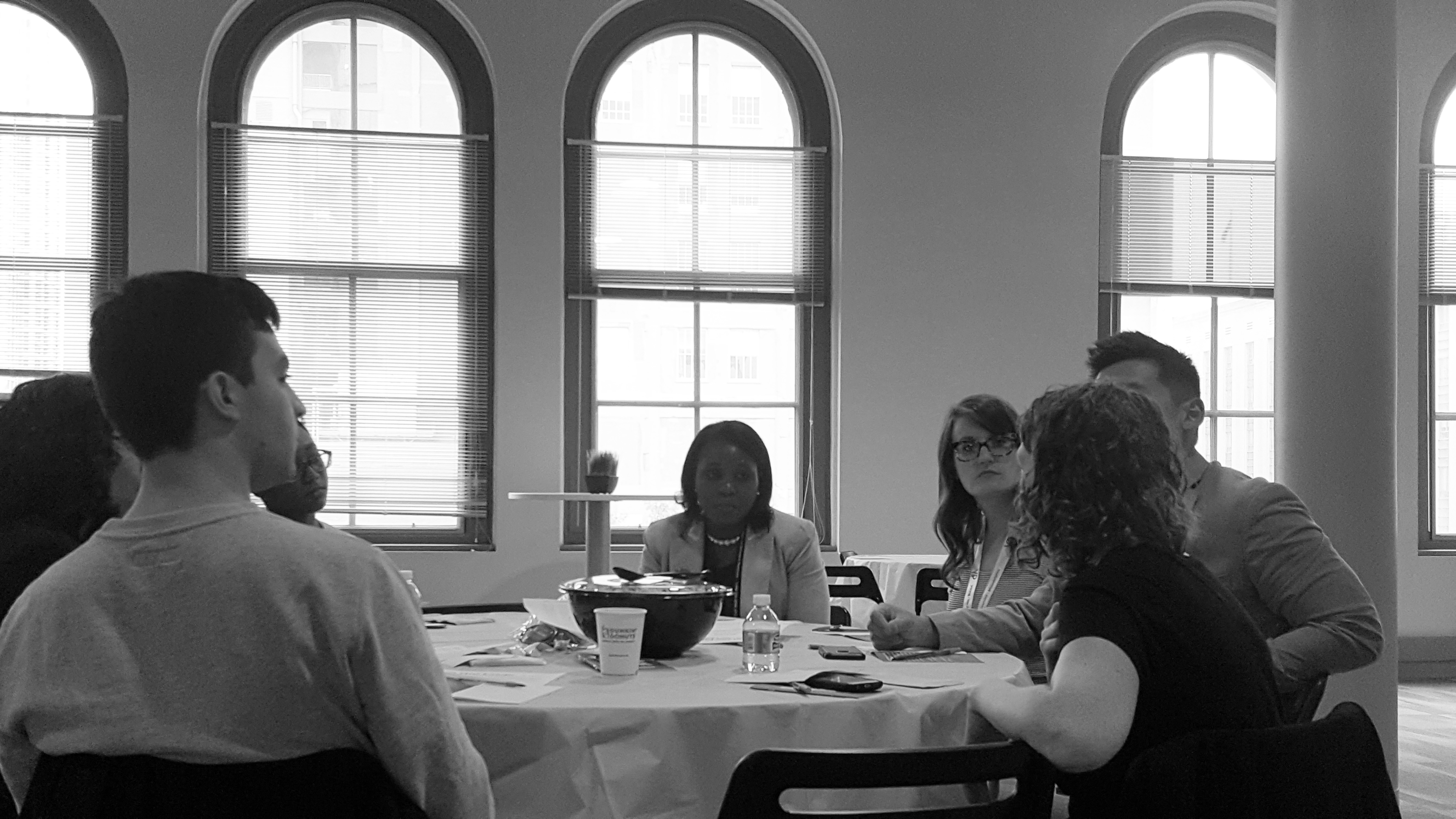
On the Table: Reinventing civic dialogue
Mae Israel is an independent journalist based in Charlotte. Below, she writes about the impact of the On the Table initiative. Today, Knight Foundation is announcing a $2 million reinvestment in On the Table to connect neighbors over mealtime conversations in cities.
Huddled around tables in restaurants, churches, offices, museums and libraries across Charlotte on a sunny day in October, thousands of people were talking, in many cases to people they didn’t know, about the city issues that matter most to them.
The goal was to move beyond the niceties of casual chats toward in-depth and sometimes probing dialogue between people of diverse backgrounds and perspectives who might not otherwise have the opportunity to say hello.
Over meals from breakfast to dinner, Charlotte’s On the Table conversations came nearly a year after protestors rioted on uptown streets following a police shooting of an African American man, and after a report ranked the city last among the country’s 50 largest cities for economic mobility of its poor. The fast-growing Charlotte area also is tackling other urban issues: rising rents, a dwindling supply of affordable housing and traffic congestion.
During a breakfast gathering, as more than 100 people sat in a church at the edge of uptown, two African American men – an award-winning teacher, James Ford, and a former Charlotte mayor, Harvey Gantt – spoke candidly.
“We need to focus on equity,” Ford advised the racially diverse crowd in a discussion of equality. “Fairness is not sameness. It may require more resources and more energy.”
More issues, including education, the judicial system, poverty, community development and homelessness bubbled up in animated conversations involving more than an estimated 5,000 people during Charlotte’s On the Table. Charlotte was one of 10 communities that took part in 2017 as part of the Knight Foundation’s national effort to promote civic innovation and stronger communities.
Inspired by the On the Table program initiated four years ago by The Chicago Community Trust to promote civic engagement, the Knight Foundation this year invested $1.15 million to expand the idea across the country.
With community foundations as the primary partners, On the Table spread to Akron, Ohio; Charlotte; Columbus, Georgia; Gary, Indiana; Lexington, Kentucky; Long Beach, California; Miami; Philadelphia; Detroit; and Silicon Valley, California.
“This initiative is civic engagement at its best and goes to the heart of our work,” said Lilly Weinberg, the Knight Foundation’s program director for community foundations. “It gets people to come together to talk about community issues over food. There is value in providing a forum for civil discourse, particularly given the trend of increasing polarization in our country right now.”
Each of the cities adapted the community conversation to the personality of their area:
- Akron’s invitation to residents to come out and talk in September engaged an estimated 6,000 people, many eager to discuss the impact of the opioid epidemic and economic development.
- In Long Beach, an estimated 2,500 to 3,000 gathered, also in September, around tables set in such diverse settings as an aquarium, a craft-beer happy hour and a gondola cruise.
- Nearly 2,000 Philadelphia residents turned out in May to share opinions about education and youth development, equity and social inclusion, public safety and the judicial system.
- Miami had more than 3,000 participants – despite taking place shortly after Hurricane Irma blew through South Florida. The Miami Foundation had one of the more successful strategies for partnerships – working with public schools while leveraging almost all of the branch libraries for events.
- In Lexington, an estimate 11,700 people showed up, launching the first of this year’s On the Table gatherings in March, convened by the Blue Grass Community Foundation. The city imbedded their planners in conversations and used the data to inform their 2025 Comprehensive plan.
In response to the momentum generated by On the Table, the Blue Grass Community Foundation has awarded $50,000 in “What’s Next” grants to 30 individuals and groups to support ideas that surfaced during the event. Lexington planning officials also took the opportunity during On the Table to solicit community comment on the update of Lexington’s comprehensive land-use plan.
In Charlotte, the Community Building Initiative, a nonprofit organization which works on racial and diversity issues, partnered with the Foundation For The Carolinas to help organize On the Table. The organization, which sponsored earlier efforts to engage residents around specific issues, reached out to individuals and groups across the Charlotte area, crossing zip codes with varying incomes. Its leaders say they would have liked to have connected with an even more diverse group of people.
The more than 200 On the Table conversations took place at retirement centers, high schools, universities, the county jail, the county courthouse, an outdoor area uptown where homeless people gather, a country club and at local businesses. Some people came because they were encouraged by their organizations. Others saw media notices and wanted to get involved.
“It was a worthy effort,” said Dianne English, the Community Building Initiative’s executive director. “It reinforced the idea of social capital and how important it is for people to have social connections.”
At Queens University, where students served as moderators for more than 50 people, the issues discussed at one table were wide ranging: the need for more affordable housing, more tutors in schools and more job training. The six participants wondered why so many poor people in Charlotte remain trapped because of problems with economic mobility.
Across town, in a church hall in a predominantly African American church, members from two United Methodist congregations joined during the evening to talk; earlier in the day some had gathered at the predominantly white church. The churches – St. Mark’s United Methodist, mostly African American, and Myers Park United Methodist, mostly white – began collaborating about 18 months ago on programs to break down racial barriers.
At St. Mark’s, a group of about 60 picked up pizza slices and salad before heading to tables seating six to 10 people. One group’s conversation focused on the challenges of connecting with people of different races and incomes when many people segregate themselves based on those circumstances.
“I’m disappointed by how upper class white people isolate themselves in Charlotte,” said Lisa Howell, a member of Myers Park, located in one of Charlotte’s most affluent center city neighborhoods. “When are we going to change? You have to be intentional, willing to be uncomfortable.”
Camille Davidson, a St. Mark’s member, agreed. “I thought that the New South meant people would be more aware of each other,” she said. “I have been disappointed. I sometimes feel like the New South is the Old South with cellophane.”
“Still,” she added, “I think today is a great start.”
Early survey results from participants, analyzed by the University of Illinois at Chicago’s Institute for Policy and Civic Engagement, which evaluated surveys from all 10 cities, indicate this is an event that bridges divides and inspires action. For example, in Philadelphia, 74 percent talked with someone they did not know and 41 percent exchanged contact information with someone they had not previously met. When asked if they made specific plans to work with another participant, 26 percent of those who responded to the survey said they did.
The results also show where community members are most interested in creating change in their communities. In Long Beach, it’s around homelessness while in Silicon Valley it’s focused around the housing crisis.
Knowledge is power and with this information, decision makers, funders and community members can be better equipped. Both anecdotal evidence and the survey data show the power of what an open invitation and food can do – bring people together to positively change their community.
-
Community Impact / Article
-
Community Impact / Article
-
Community Impact / Press Release
Recent Content
-
Community Impactarticle ·
-
Community Impactarticle ·
-
Community Impactarticle ·




